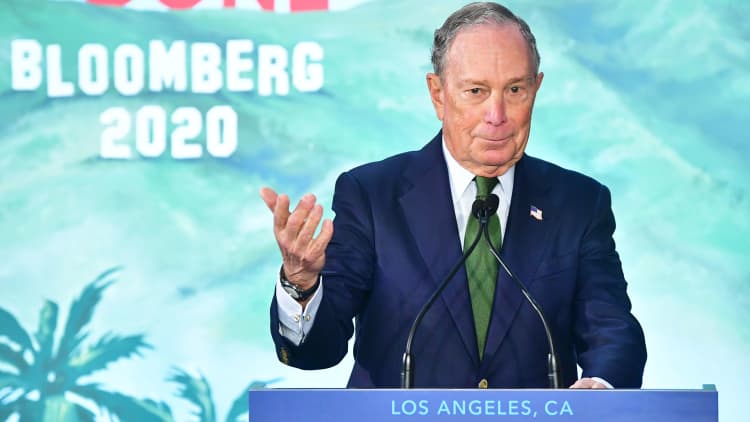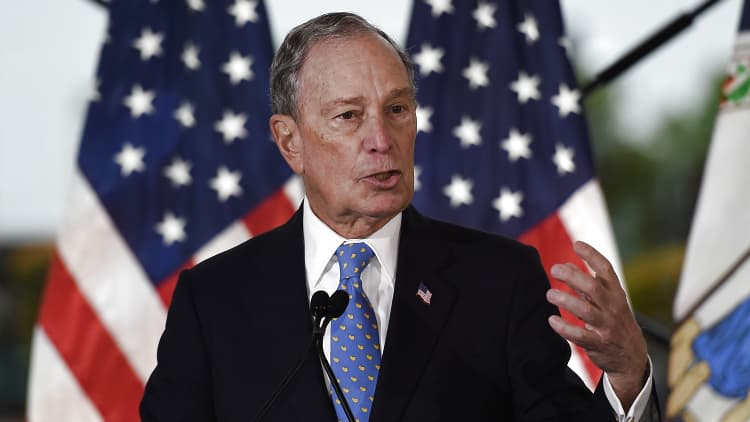Former New York Mayor Michael Bloomberg is seen as the Democrat most likely to defeat President Donald Trump if nominated, according to an analysis of online betting market data by researchers at Standard Chartered Bank.
But Bloomberg, who has spent hundreds of millions of dollars on his nascent bid for the presidency, still only has a 10% chance of winning the primary, according to researchers Steve Englander and Geoff Kendrick, who published their findings in a note on Tuesday.
Bloomberg is far from the front of the Democratic primary field in national and state polling, though he has ascended rapidly in recent weeks in large part as a result of his unprecedented spending. Bloomberg has spent more than $200 million on his campaign so far and has said he may spend up to $1 billion to defeat Trump even if he is not the nominee.

The research note from U.K.-based Standard Chartered attempts to explain the strength of the stock market despite polling that shows that Democrats are likely to defeat Trump in November's election. Analysts have speculated that financial markets could plunge if one of the race's progressives is elected, though the major U.S. indexes have continued to set records.
Englander, in an interview, said that the standard answer for why the stock market isn't reacting to much of the volatility of the 2020 race is that the election is "too far away and too hard to hedge."
"But this is an alternative answer: That the candidates that are most electable are seen as the least unfriendly to asset markets," he said.
Englander and Kendrick wrote in the note that it's possible that investors believe it is likely that Trump or a moderate Democrat who is "sympathetic to asset markets" — notably Bloomberg or former Vice President Joe Biden — will ultimately prevail.
"Among investors, Bloomberg and Biden are probably viewed as the most asset-market friendly among the Democratic candidates, so their greater implied electability may be why US assets are not showing more stress," the researchers wrote.
The researchers suggested it could also be too early for markets to be affected by the 2020 race and that investors may believe that candidates could face trouble enacting their agendas if elected.
Englander and Kendrick wrote that the decline in the past few weeks of one of the leading progressives in the race, Sen. Elizabeth Warren, D-Mass., may have neutralized the impact of the other, Sen. Bernie Sanders, I-Vt., in the eyes of investors.
"Sanders' nomination probability has risen in online markets, but Warren's decline may have matched or exceeded his move," they wrote.

Warren has slid in a number of polls conducted since early October, while Sanders has gained some steam and is now in second place behind Biden. The outcome of the primary's first contests in Iowa and New Hampshire next month, where the top candidates are all within spitting distance of a first place finish, could shape the race.
The researchers wrote that Sanders' electability is perceived to be slightly behind Biden, while Warren and Buttigieg "look to have relatively low odds of beating Trump" if nominated. Trump, they wrote, has a 55%-60% chance of winning if nominated, a greater shot than any Democrat. Incumbents are generally seen as having an electoral advantage, particularly when the economy is seen as strong.
Representatives for the Trump, Bloomberg, Sanders, Warren and Buttigieg campaigns all either did not respond to or declined requests for comment.
The researchers analyzed data available on two websites where gamblers can place bets on the outcome of political events, Betfair and Smarkets. They also interpreted data available on Oddschecker, a website that compiles data from a range of online markets.
The analysts noted that online betting markets have drawbacks.
"We use online markets but are mindful of their limitations," the researchers wrote. "The views expressed though the markets may be wrong (just as polls often are) and the probabilities they generate may not be reliable if the markets are relatively thin."
A thin market refers to one in which there is only a small number of buyers and sellers. Online betting markets are generally far thinner than financial markets, for instance, and therefore less reliable as a measure of investor sentiment.
"The nice thing about the online markets is that they ask very specific questions. And the not nice thing about them is that they are kind of thin — they are not the Treasury market," Englander said. "So you have to be careful not to overstate the reliability. But you can take it as another piece of evidence, or another indication of what people may be thinking."
Larry Sabato, a top elections analyst and director of the Center for Politics at the University of Virginia, said he welcomed the betting markets analysis, but cautioned that elections can be unpredictable and that Bloomberg's path to winning the Democratic nomination is a steep one.
"In 2016 no one got it right," Sabato wrote in an email. "My philosophy is, let a thousand flowers bloom. The more analyses like this one, the better. Groupthink has caused more good people to get it wrong than any other factor."
Sabato said that Bloomberg could have an opening if the first four states to award delegates — Iowa, New Hampshire, Nevada and South Carolina — produce four different winners.
"Then he might be able to offer Democrats a way out, beginning on Super Tuesday," Sabato wrote. "Stranger things have happened (such as Trump)."
A spokesperson for Oddschecker, Pete Watt, said in a statement that the key difference between polling and betting markets is that "polls ask participants to state their personal voting intention, whereas betting markets present punters with an opportunity to back who they actually think will win."
"Millions of dollars have changed hands already with over 10 months to go until the election, with even more to be staked between now and November 3rd," Watt said. "And it is important to understand that as the amount grows, the degree of accuracy grows with it."
The president himself is eyeing Bloomberg closely, according to a report published Tuesday in The New York Times, unsettled by his financial resources, though his aides told the paper that they do not see Bloomberg as a serious challenger.


